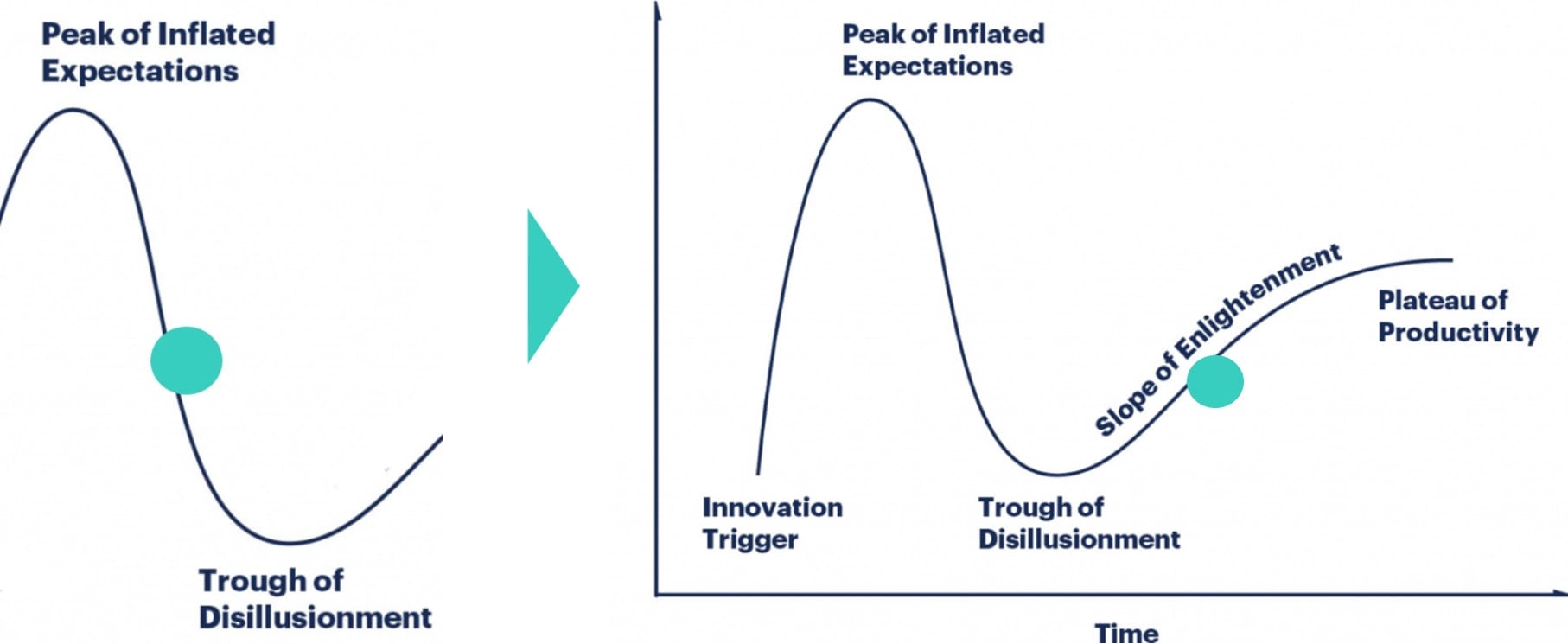Slope of Enlightenment
.jpg)
work in progress
- AI. Now public – nexos.ai just announced €30M Series A, co-led by Evantic Capital and Index Ventures, with support from Creandum and DIG Ventures, just six months after seed! Supernaut launches with EUR 530k backing by Superhero Capital. Silver Keskküla with scamguardian.ai is now backed by Estonian angels. And there is another set of AI-native Baltic teams that keep funding in secret, just to wow us later.

- Retail 3.0. Traxlo was selected among the Top 100 startups at the Startup World Cup. Pickitoo is building Lite, a new solution designed to help smaller retailers enter the q-commerce market faster; also partnering with Starship Technologies and REWE in Hamburg for autonomous delivery. This brings us to Plural fund leading series C ($50M) for Starship, a double-down after doing another round last year. It looks like GTM inflection point as use cases have been proven and the company starts to scale in Europe+US. This reminds us about technology adoption curve:
Did we miss that again? Just learned that Waymo's autonomous cars are landing in London, but few months ago it seemed like they would never get commercialized? It's a bit of a trap. We know every new technoloigy shift first hits the hype (peak of expectations). Then advancement slows down, and we start to dismiss it. And it beome easy to miss it, as tech continues to improve and it returns to the market better, faster, cheaper.

It happens again and again. Autonomous cars took almost 20 years for the last 1% to make it safe enough – but now, rolling out. Similar to electric vehicles – I am still having discussions with friends stating that, "look, Porsche is getting back to petrol" – but in reality, there is no competition anymore – electric won, by a large margin (and 800 km range). EV sales are growing 25% annually; yet we don't see full effect since China represents almost two-thirds of electric cars sold globally (yes we talk Norway, but half of new car sales in China are electric). AI will go through the same curve, the moment we get bored with ChatGPT, companies will be rolling out AI-powered robotics and whatever else.
- Dual-use and hardware. PD Kinematics started negotiations to secure up to 1M in funding from Coinvest Capital + private investors. Unbound Autonomy is applying AI to identify critical sounds – raising for AI pin development. Dual-use founders handbook (Balnord). Not dual-use (unless we don't know), but AISPECO is growing well – they build advanced geospatial data collection platforms.
- Sustainability. An industrial-grade system that sorts pre-owned LEGO bricks with over 99% precision is launched – and Sort A Brick is about to add more capital. Tingit expands the scope to cover electronics repair. Actively deploying, Contrarian Ventures backs Bees & Bears in Germany – they are building the rails for green finance. Esgrid seems to be pivoting to supplier discovery product.
- Starting fresh? Well Deel is at 17B valuation now but started just as humble as you. Karolis is searching for Co-founder & Head of Growth to join in building NüRule. Domas will share his startup therapy session on Nov 4th. Armandas launches sunflwr – it joins your meetings and gives you the feedback nobody else will – honestly, immediately, and without judgment.
- Hacker club. Hack4Planet – this weekend, fighting energy waste. AI–only Hackathon by Teso, Hostinger, nexos.ai, will be huge (Nov 14-16). FR8 Year One: Chaos & Conviction.
rounds and capital
- nexos.ai secures €30M Series A co-led by Evantic Capital and Index Ventures, with support from Creandum and DIG Ventures – massive!
- Supernaut AI has raised a €530,000 pre-seed investment from Helsinki- and Vilnius-based venture capital fund Superhero Capital.
- Yaga raises €4M pre-Series A – following the footsteps of Vinted? Led by Specialist VC, with support from H&M Group Ventures, Trind Ventures, Startup Wise Guys, and and a group of angel investors.
- Lifeline Ventures, first backer of ŌURA, Wolt, Supercell, and ICEYE raised a new €400 million early-stage fund (backing Baltic founders like Soldera and Saltz).
- SOUND Asset Management launches „Sound Senior Private Debt Fund 1“.
founder's guide
- Kart from Superangel on VC round mechanics
- Build a LinkedIn Flywheel, not a disconnected social strategy
- B2B founder’s guide to generating demand from scratch
- Jason from SaaStr on all things building agents from scratch.
- Founder Compensation Survey from Creandum – share your data
further insights
- Andrej Karpathy adds notes to his own podcast
- How courage is now most scarce resource in venture:
It requires non-consensus investing, but that’s only part of it. I think courage is thinking independently, and betting BIG on something when it feels really really hard to do it. Courage is putting yourself, and your reputation, and your firm on the line, and being willing to face real consequences if it doesn’t work. It’s not just a willingness to look dumb, but it’s a willingness to get fired. The best founders do this almost every day.
the hard skills are getting softer and the soft skills are getting harder
ecosystem
- Traveling last week which always makes me think about infrastruture, regulation, and what makes societies better than others. Rant edited with AI.
The Missing Layer Limiting Baltic Countries
The biggest problem in the Baltic states isn’t capital, talent, or entrepreneurship. It’s the chronic underinvestment in governance capacity — in the people who actually run the machinery of the state.
We have too few world-class leaders in the public sector. Not politicians — professionals. Career civil servants with the competence, confidence, and vision to shape policy and see it through.
We can’t afford to be governed poorly. Yet we keep mistaking good intentions for capability. It’s not enough to send delegations to Singapire, post photos of how everything works there, and hope to copy-paste the results. What’s missing is world-class leadership in bureaucracy — people who understand regulation, infrastructure, and economic development at the frontier level, and who can mobilize resoures toward a clear vision.
When that kind of leadership exists, it compounds.
Think of Lithuania’s Fintech ecosystem — built not by accident, but by a small, sharp group of people who knew what they wanted to achieve and how to make it happen. Or Estonia’s e-Residency, which turned a niche digital program into global soft power.
Across the region, there are isolated pockets of excellence like these. But on average, there’s a massive performance gap. Imagine if transport, education, or healthcare were led by people who actually knew their fields in depth — and had the authority and persistence to drive evidence-based reform.
We keep over-indexing on elections — on who gets elected, who forms a coalition — while ignoring the fact that most high-performing economies are steered by a professional public service that remains steady regardless of political cycles. We could survive mediocre politics if we had a layer of bureaucrats who were truly world-class.
That’s the real leverage small countries like Lithuania have: competence density in key public institutions. And yet, for decades, we’ve failed to transform how government recruits, trains, and retains talent. We pray for better education, healthcare, or transport, but none of that is possible without capable people in the right positions.
.jpg)

